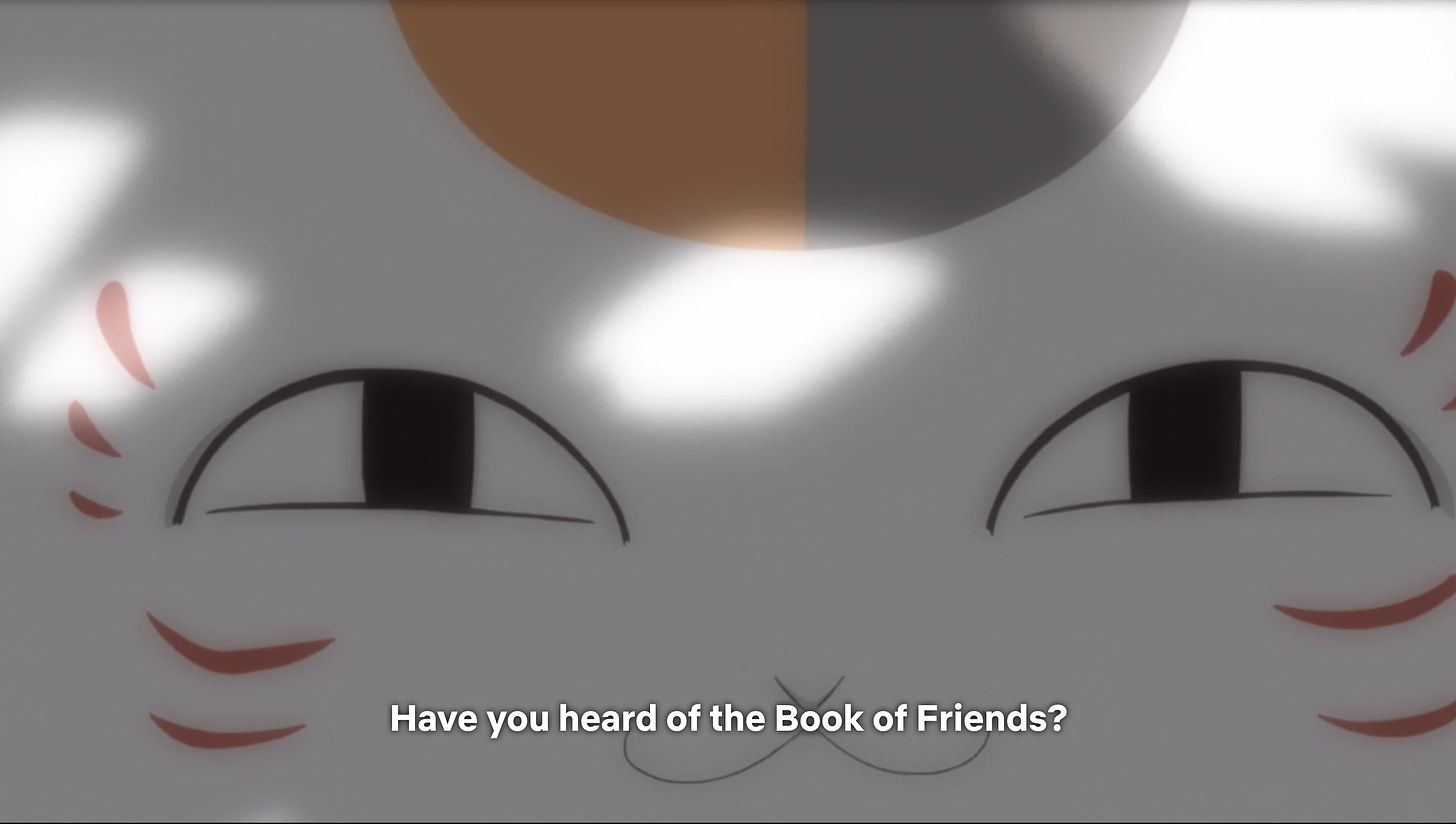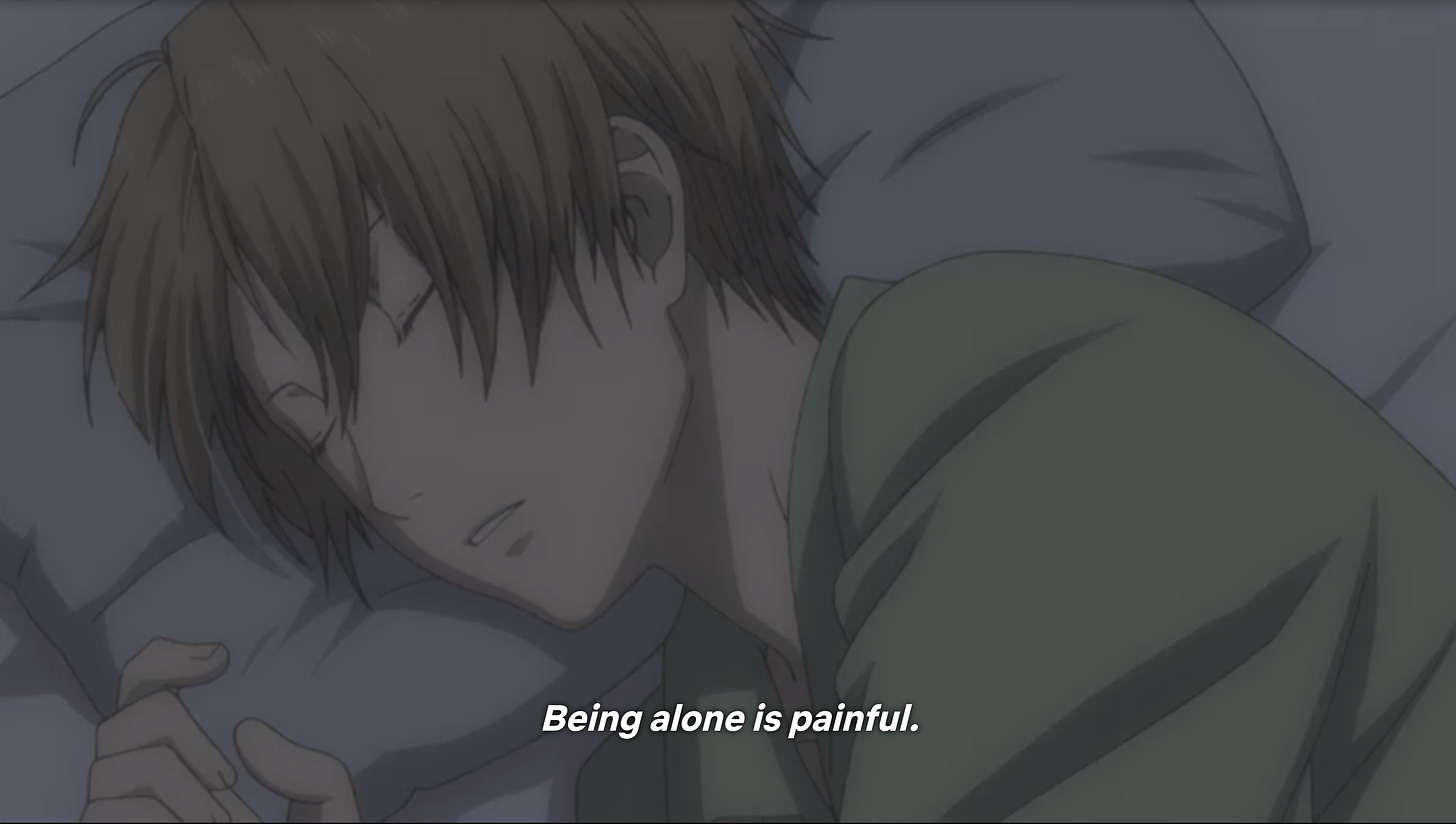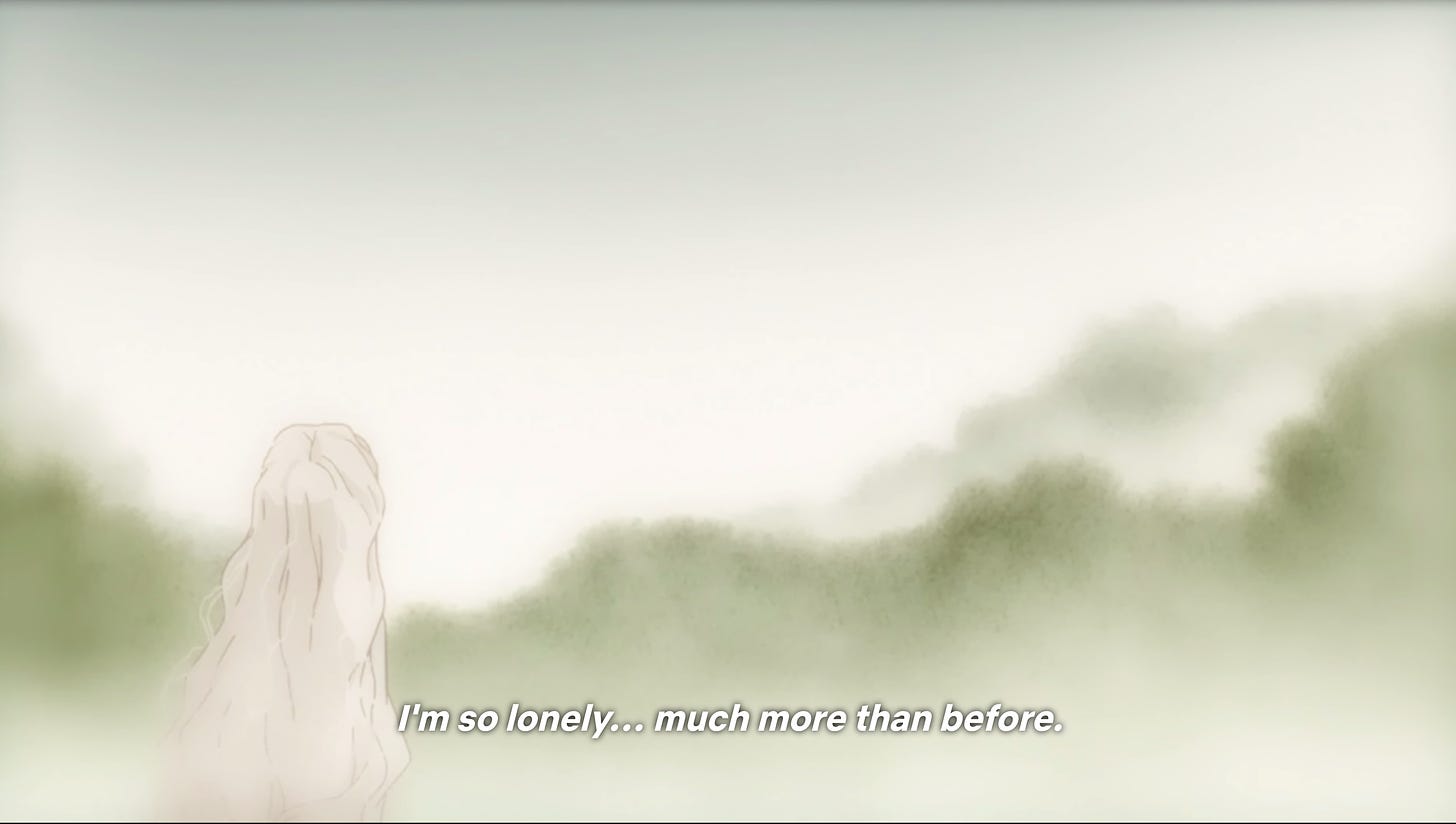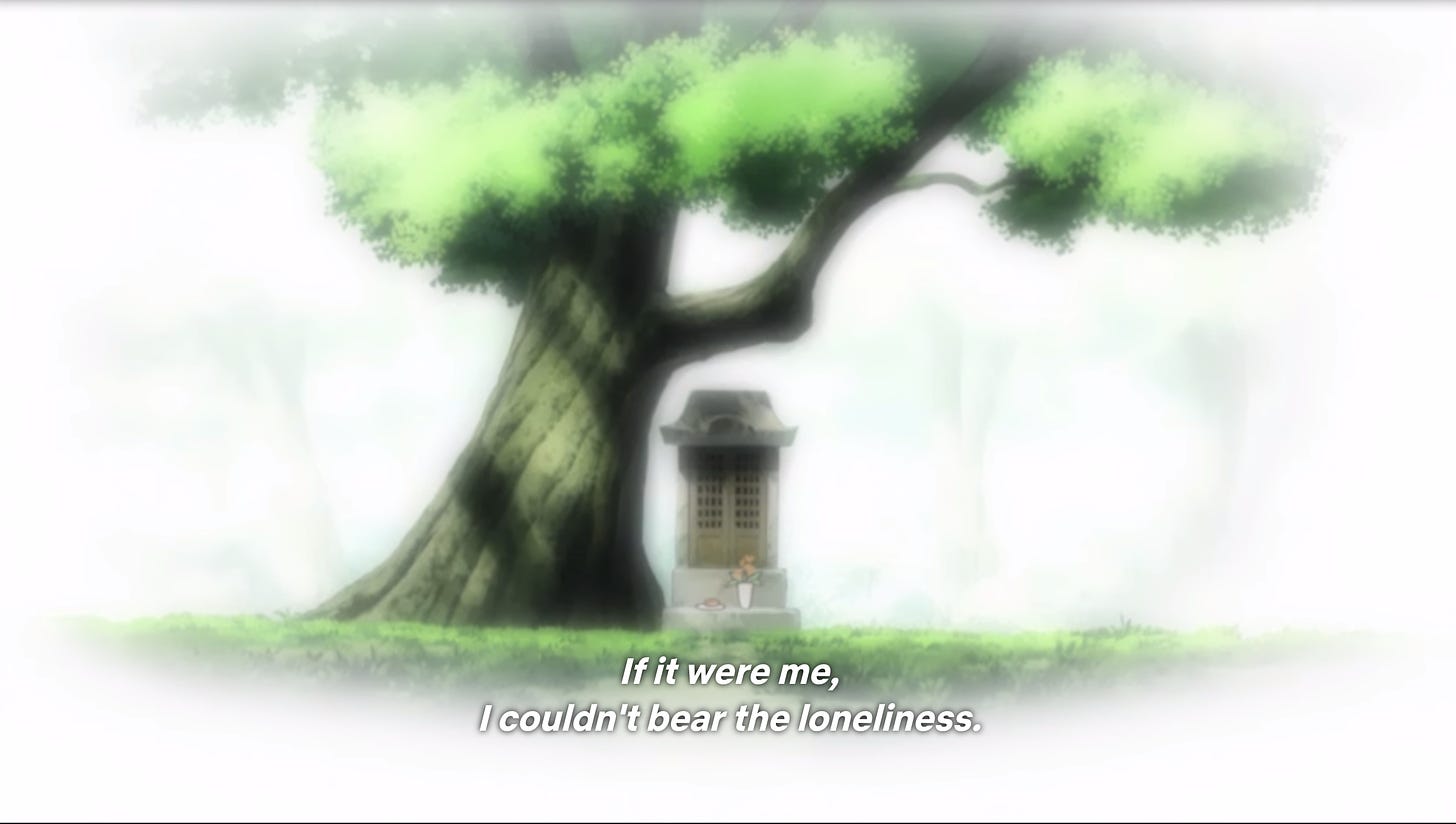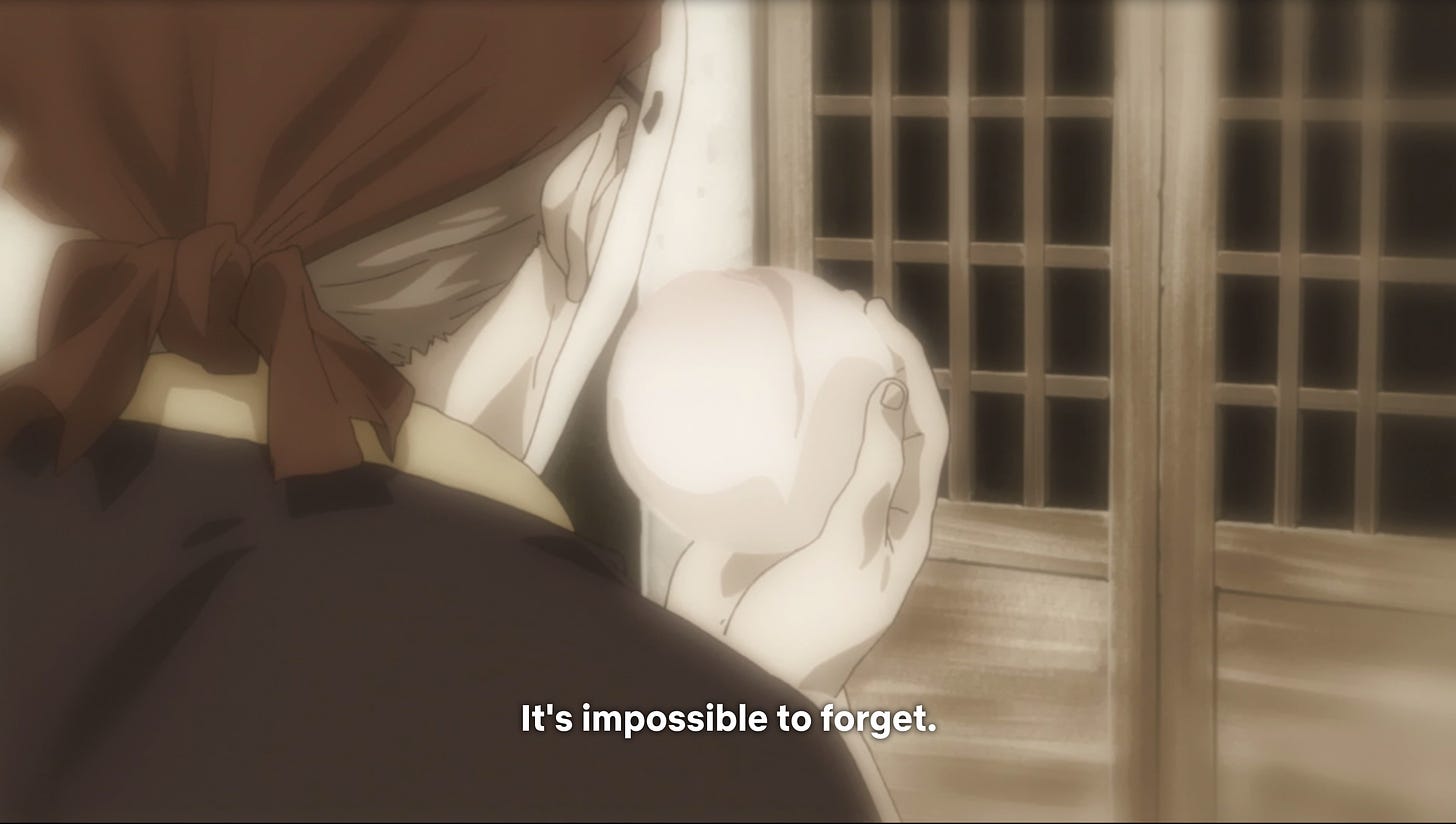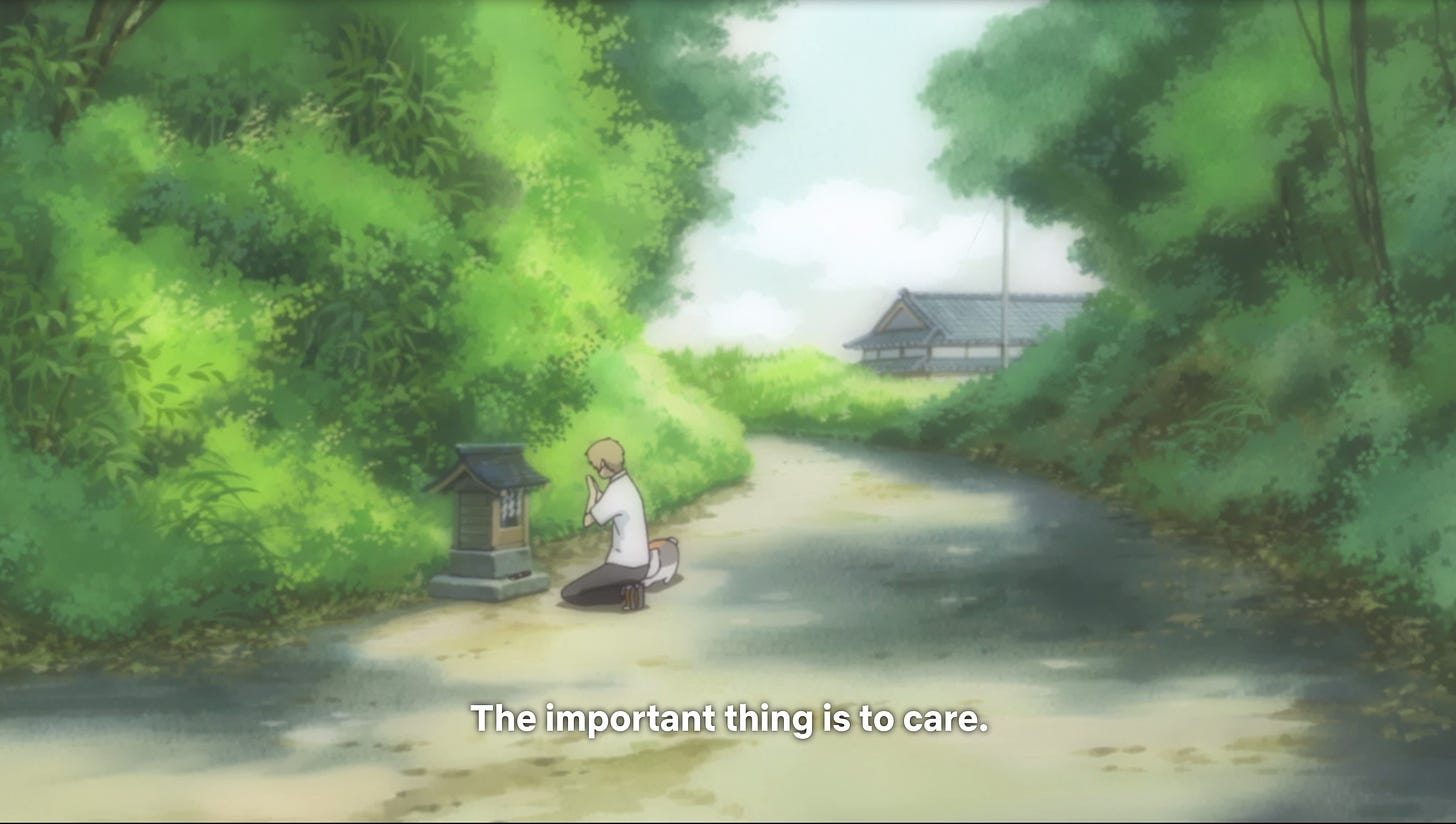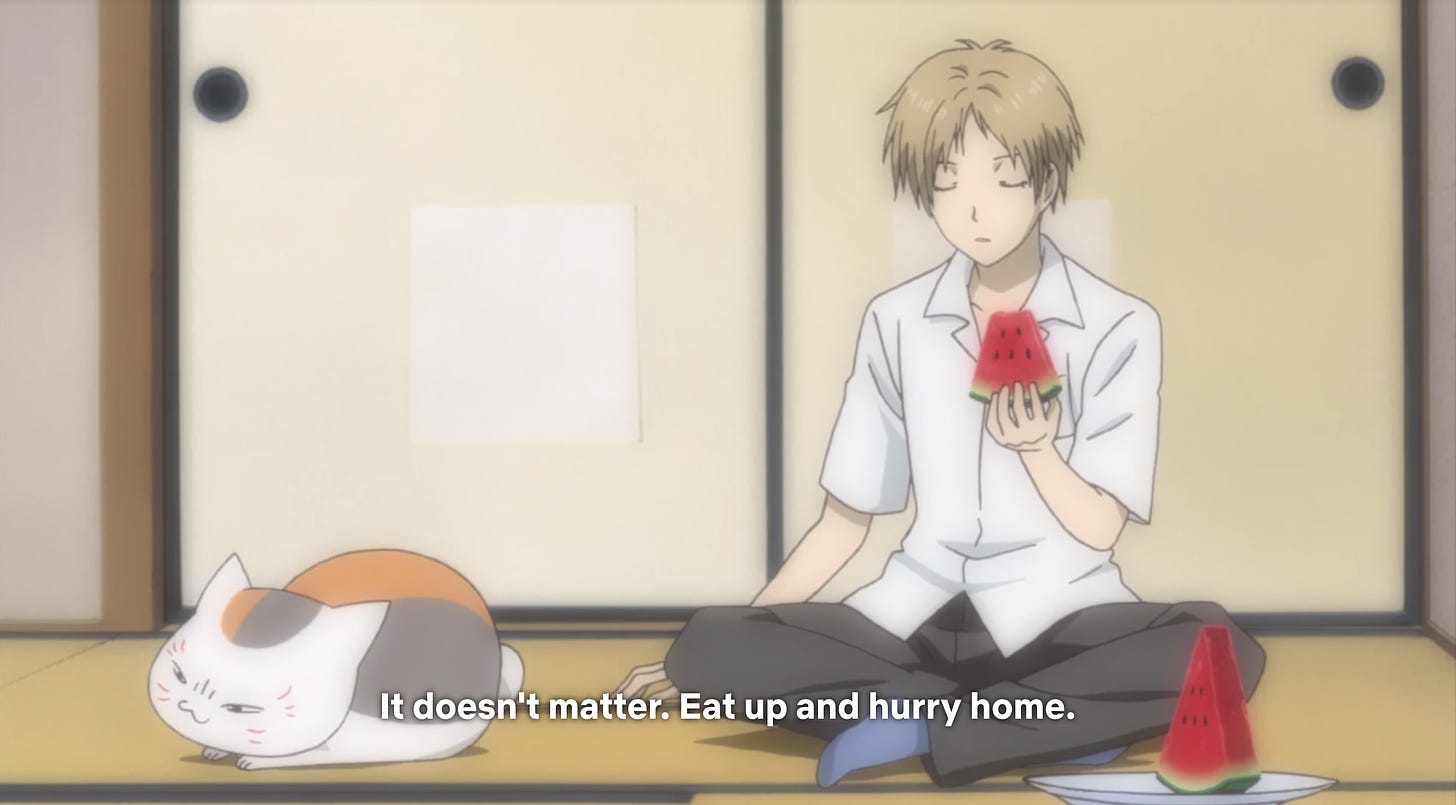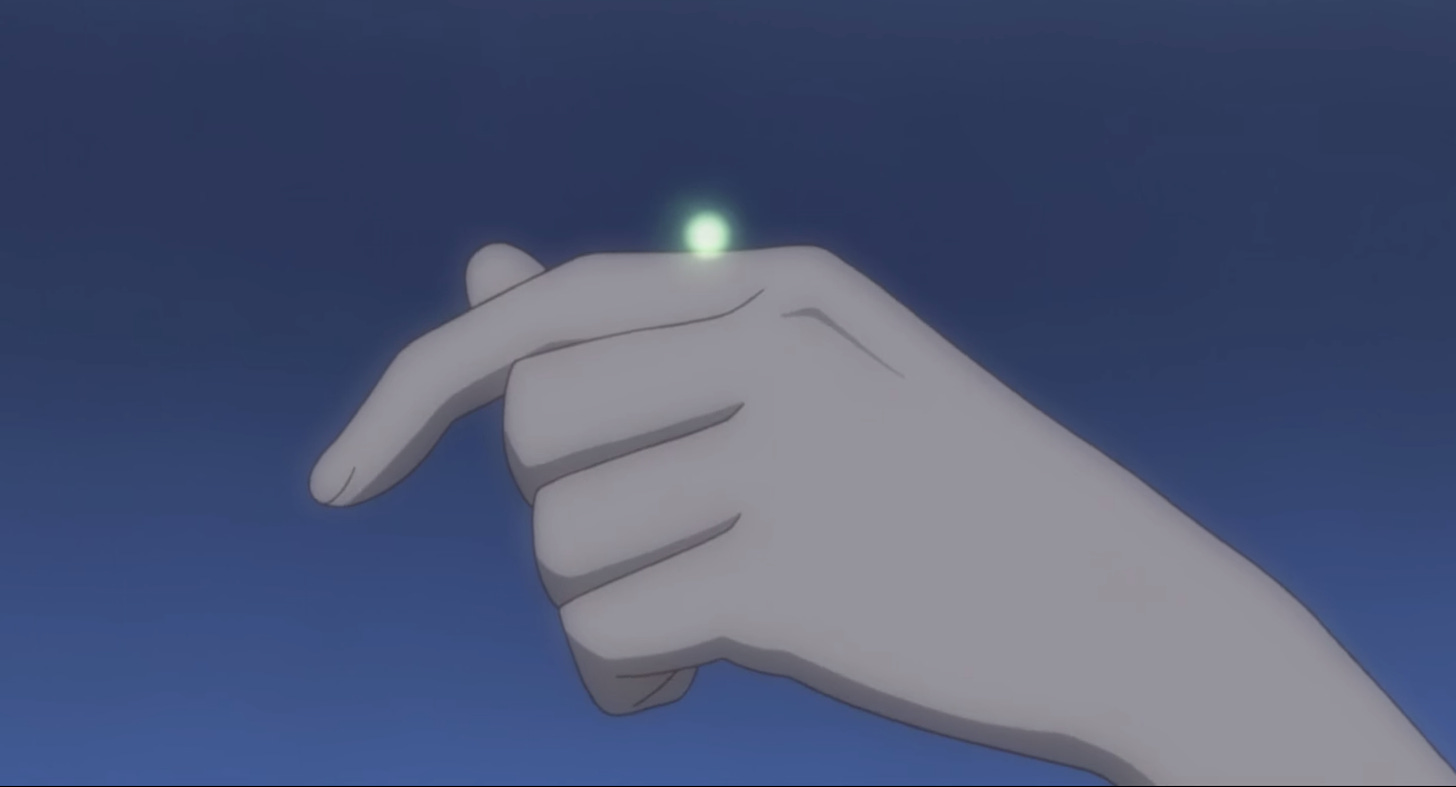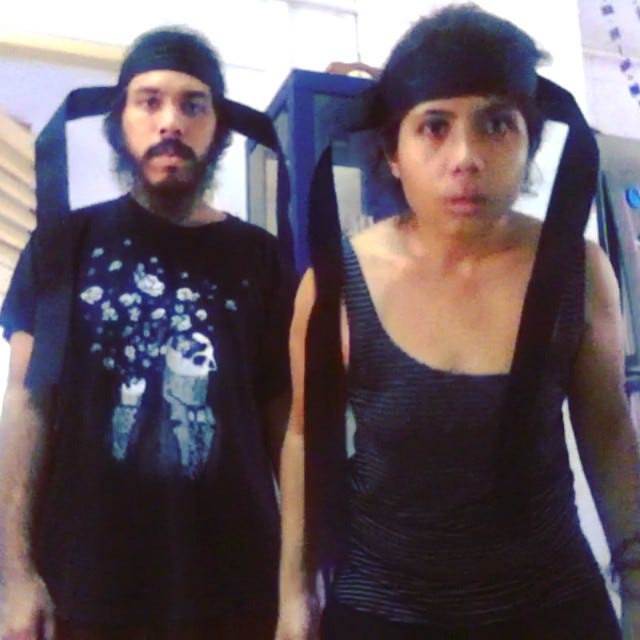To taste the same thing, in the same moment.
This month we take a gentle swim in the company of others, of seeing and being seen, in sweet communion with friendships as I take a few pages from the heartwarming anime Natsume's Book of Friends
(i) “…another day where you don’t call my name”
There is a playground at the back of the block at my old house in Jurong West. My mother would park me there when I was young and would spend the morning catching up with Cik Bibah, our neighbour who lived on the ground floor right in front of this playground. Her door was always open and my mother would peek to check if I was still alive. One morning, and I remember clearly to this day, there was an older girl at the end of the concrete slide. She had long black hair and was in a squat collecting tiny rocks into a square plastic container. During these pre-internet days, kids from the neighbourhood spend our hours seemingly in these long plays. Time was not as dense or saturated, not as occupied.
Being the youngest, I was always left to my own devices. I remember staring at this older person with a yearning to accompany her in her earnest task of collecting these small rocks, to be included in this precious club with only one member. I remember the clanking of the swing, the dirty sand between my toes, the girl looking back several times as I slowly made my way, smiling with excitement. I could not remember the interaction that came after, a missing block, clunky recall, but I remember asking for her name, the rain of small rocks flying towards me, a sharp shock against my face and warm tears that followed. My eyes shut tight, first from reflex and then from shame. I was probably four or five but I remember this moment realising that an ache will always follow a yearning.
***
In the first episode of Natsume’s Book of Friends The Cat and the Book of Friends, we meet Natsume who is running through the woods away from a yokai with long straggly hair and a big giant eye. He tripped and fell in front of his two classmates. Covered in mud and terrified, his worried classmates asked him what he was doing and whether he was okay. He brushed the question off and asked them if there was a shrine nearby and when they pointed him to the direction, he ran off.
“— He’s a pretty odd guy”
“—He transferred here and I don’t think I had one normal conversation with him.”
“—Somehow he seems hard to approach”
As he was running, Natsume exclaimed in an inner monologue, “They are lucky not to see what I see.” Natsume is then cornered by the yokai who calls him Reiko and refer to him as a girl. The yokai asks for something to be returned. He kicked himself free and as he was running exclaimed “Why does this happen to me? I never asked to see these things”. This is followed by a flashback of a young Natsume trying to convince his adult carers of these spirits that only he could see.
“That boy, he is talking strange again”
“He just wants attention. He’s lonely.”
“Are you sure? Somehow he gives me the creeps”
Throughout the series, we get to see these flashbacks of his younger self being rejected and disbelieved by different carers. We learn too that Natsume is an orphan and have been passed around first to different relatives and then to non-blood relations who took him in as their temporary ward. We witness him being ostracised by his peers and isolated from other people.
Natsume tripped on a rope, tearing it which in turn broke a sealing spell and releases a yokai by the name of Madara, a majestic canine dragon mash-up who takes the physical form of a fat and squishy cat named Master Nyanko. In the series, they become an oddball pairing and what seemed to be at first a transactional arrangement slowly develop into a deep friendship (will get to that later). Anyway, Master Nyanko mistook Natsume for Reiko, and when Natsume explained that Reiko is actually his late grandmother. Master Nyanko remarked that upon a closer look Natsume is a man to which Natsume replied that it’s so obvious that he is even without a closer look to which Master Nyanko replied rather snarkily “Unlike you humans, we are not so sensitive about gender”
Here we learn of the Book of Friends, belonging to Reiko who spent her time tricking yokai into giving her their names and putting them in service of her. When we see the book later it is full of names and the spirit that was chasing after Natsume earlier wishes for their name to be returned so that they could be free. We also learn that much like Natsume, Reiko too has the ability to see spirits and was always alone. In a later scene, Madara pounces on Natsume and insists that he hands the book over.
“This thing, this book of friends, for me is a valuable heirloom from my grandmother. It’s true that my grandmother didn’t get along with people. Barely anyone remembers her. She died when she was still young and basically since I am her only surviving blood relative, I want to stay connected to her. I don’t want to pass the responsibility to anybody else.” But obviously Natsume feels seen by his grandmother, that he is not the only one with this ability, this loneliness and knowing that probably made him feel less lonely. Ah my heart.
Anyway Natsume returns the name of the yokai that was chasing him at the start of the episode by calling out to the book to reveal the spirit’s name, tearing out the page and clamping it between his lips. Once he exhales, the calligraphic lines are released into the air and the yokai is finally free. We see Reiko’s first and only encounter with the yokai, who was also lonely. Reiko introduced herself and then challenged the yokai to a battle, and immediately whacked them on their head with a bat. A win is a win she says and the yokai handed over their written name to Reiko. Upon seeing a scar on her face, the yokai asked and Reiko replied “Oh someone threw a rock at me because I’m weird they say”..
And so the seasons pass and so did time and the yokai kept calling out for Reiko. But she never came back.
Yokai: Give me back my name. No matter how long I wait if you never going to call me!
Natsume: Hishigaki
Yokai: Reiko, is it ok now. Are you ok alone without me?
Natsume: I’m sure my grandmother never felt alone. Thank you Hishigaki, my grandmother kind hearted friend.
We see that through this interaction, Natsume begins to understand Reiko a little better. Her loneliness but also companionship and intimacy she shares during these fleeting encounters with the spirits that she befriends.
**
In a different stream of reference, I came across the letters between Pat Parker and Audre Lorde, both poets and activists, dating from 1974-1989 which documents not only the building of a black feminist literary politics, but the personal support, generosity and advice shared between them. In one of the letters I found this paragraph Audre Lorde wrote when Pat started to doubt her writing:
“I have always loved you, Pat, and wanted for you those things you wanted deeply for yourself. Do not think me presumptuous—from the first time I met you in 1970 I knew that included your writing. I applaud your decision. I support you with my whole heart and extend myself to you in whatever way I can make this more possible for you. I hope you know by now I call your name whenever I can and will continue to do so.”
And also this:
“Take care of their names when they’re not in the room.” <3 Ahh. (We learn too much later that if the names on these pages of the book are handled precariously, the spirits will feel them too and if they are burned, these spirits will turn to ashes.) So remember your friends, call them by their names, and hold them in delicate memory, tenderly on your lips.
(ii) But once someone knows love, it is impossible to forget: On queer friendships and deep love beyond the normative.
In the years that follow, friendship never felt natural. I was a strange kid who had trouble expressing myself, stared too hard, played too rough. I was too dreamy. Too active, too messy. In kindergarten, when we had to pick a partner to pair with, I always end up either by myself or paired by the teachers to the last few kids remaining. I had strange habits; taking bits of hair and putting it into my mouth making it wet with my saliva, clumsily breaking crayons or falling off the chair, never able to understand simple instructions or engage in conversations. In primary school, I did not have that one friend or that one group. Instead, I float among other kids, kids like myself, with crumpled worksheets, unkempt hair, troubled kids, misfits, kids who were bullied.
I found no trouble connecting deeply with older folks though With my great-grandmother, Nek Yang, as she sat by the window, her clove kretek between her fingers, smoke billow lazily in a spell-cast of stories and laughter, Tok Mat who came to visit twice a year insisted that he fetched me every afternoon from school and we walked through a park picking ixoras and pulling out the nectar, as he taught me different doas, how to cool down the hot sun, or how to calm a barking dog and Cik Bibah, the lonely widow, who would borrow me on some nights to watch Indonesian exploitation horror films like Sundal Bolong or Malam Jumaat Kliwon only to send me home with a bout of vivid nightmares that would last for weeks. My mother would exclaimed in sheer frustration over phone calls with relatives, making sure it was loud enough for me to hear, takder orang nak kawan dengan dia, because I was weird or fat or sensitive or clumsy or…
But I do remember some of my early friendships so vividly, so dearly. With R in primary two when he taught me how to play chess so effortlessly. We were separated when we were streamed to different classes. Or J who I was close to during my secondary school years and how people kept calling us lesbian lovers even though we truly just enjoyed each other’s company. J’s family took me in when I left my father’s house after an altercation and I squeezed into the bottom bunk bed with her and ate at their table for months, for free. Or S, who brought me out on this silly adventures after school and we’d always get detention time together, the only two girls out of a group of wayward children consisting mostly of boys.
In the second episode titled The Dew God’s Small Shrine, we meet Tsuyukami who is a god that wishes for his name to be returned. Upon finding it, Natsume realises that his name is stuck to another name, and when he tries to peel these two pages apart, Tsuyukami screamed out in pain. To solve this situation, Natsume and gang has to find the other yokai so that he is able to release them both. As they spend days searching for this other yokai, we learn a bit about Tsuyukami.
Tsuyukami isn’t really a god but a spirit who reside in that area. A long time ago, the area was hit by a drought and the villagers came to the shrine to pray for relief. The following day, heavy rain began to pour and the villagers named the shrine, the shrine of the dew god and prayed to Tsuyukami and brought him offerings. Tsuyukami grew in power and size. However, Tsuyukami is really small now as the number of devotees have decreased over the years with only one remaining; an old lady by the name of Hana who’d come bearing peaches and sit to pray. We met Hana earlier in the episode and Natsume had beat himself up for not being able to sustain a conversation with her and found it really hard to do so, even with other humans.
Natsume met her again and she recounted the time in which she felt she saw Tsuyukami sitting a top the tree and heard him say “Nice weather today” but she pretended not to hear him in case he disappears upon the knowledge of being seen. But she felt she should have because he must be lonely being all alone with no one to talk to. She said to Natsume, “If it were me, I couldn’t bear the loneliness.”
As the matter was resolved in the following days and Tsuyukami was finally free, we see that Tsuyukami had grown even smaller and was glowing, slowly evaporating into air. We learn that Hana, who had been chronically ill, has passed away and he no longer has any devotees and he too will disappear. When Natsume offers to pray and send offerings, Tsuyukami said that he is satisfied and wishes to pass on with Hana. He says, but once someone knows love, it’s impossible to forget. </3
We see a scene of a younger Hana walking, in the past, as the evaporating Tsuyukami held on to Natsume’s finger saying,
“All this time, all i could do was only watch. But now, she and I can finally touch.”
We see an afterlife of sorts with a younger Hana, on the same day that she had seen Tsuyukami. But this time it’s different. He said nice weather today and she replied, yes it is! I think of my own friendships growing up, how fleeting they are in nature, and how they are not build on common interests or similarities but rather something deeper. The feeling of being seen, and seeing others for who they are. Although this episode centres around devotion, there is also this feeling of closeness that is rather queer in nature. I grow bigger with your love, nourished by your offering, my friends who have long passed on to an afterlife and I hold memories of you dearly in my heart. And for those too who I’ve encountered over the years, just once or many times where we offered ourselves momentarily before dispersing with time, I still hold you close.
In the infinite possibilities of queer friendship, Sohel Sakar wrote
“Queer friendships, built on a shared sense of belonging and care, can be transformative. My queer friendships not only offered me solidarity and support, they were also a space where we could collectively question and unlearn the heteronormative patterns we had inadvertently internalized. They were my earliest (and still most fun) gender and sexuality seminars, a place to explore who we were and might be, and envision queer futures together.
To be clear, when I talk about queer friendships, I do not just mean friendships between queer-identifying people—although that is a big part of it. For me, queer friendships are essentially about connections and intimacies that refuse to conform to normative ideas of what relationships should look like. Scholars of queer theory have often argued that queerness is not necessarily limited to sexuality or sexual orientation. Others have pointed to the term’s inherent resistance to strict definitions, preferring to think of it instead as a "zone of possibilities." To this way of thinking, the only label that can be assigned to the word queer is an anti-label stance. That leaves our interpretations of queer friendships and relationships open to infinite possibilities.
In the closing scene, Natsume offered up some treats to a now empty shrine. Master Nyanko exclaimed that it’s such a waste because there are no longer spirits to which Natsume replies Even if there are none now, there might be one tomorrow. The important thing is to care”.
(iii) In the company of others: On neurodiversity and ways of touching you, my love.
“She peels an orange, separates it in perfect halves, and gives one of them to me. If I could wear it like a friendship bracelet, I would. Instead I swallow it section by section and tell myself it means even more this way. To chew and to swallow in silence here with her. To taste the same thing in the same moment.”
―Nina LaCour,We Are Okay
In the first episode of Natsume Book of Friends, there is a scene where Master Nyanko and Natsume meet again, for the second time in Natsume’s room. On the floor is plate of two watermelons. Natsume takes one and offers the other to Master Nyanko. They talked and argued a little about who gets to keep the book whilst eating and somehow their strange friendship begin.
Here is the etymology for the word company:
Com (to gather) + pane (bread) give us companion. Thus, your companions are the ones whom you are together “with bread. Literally.” For the Latin speaking world and its cognates, companion wasn’t a general term. Your companions were the ones you ate with, the ones your broke bread with, the ones you shared a common table. The one you share nourishment with, tasting the same thing in the same moment.
A narrative through-line that exist in Natsume’s Book of Friends revolves around loneliness and the struggle to connect. There are yokais who gathers in groups and those that are alone. The yokais that have their names sealed in this book are usually ones struggling with being understood. The ones who are alone. A little different in their manners and ways. Maybe loneliness attracts loneliness and the bread we are breaking is a triumph of that difference. Maybe difference is a deterrence to achieving longevity of a friendship’s lifespan. Ok maybe not a deterrence but more so that in this difference there is an understanding that longevity is not necessary for deep connection. The bread itself is this serendipitous intersection of shared experience that does not require an infinite quantity (or at least one that lasts for a long time) for it to be meaningful.
In episode 8 Fleeting Light, we begin the story with Natsume and Nyanko at the lake. There he met a man whom he greet rather awkwardly and the man asked whether he was there to witness the firefly season. Unbeknownst to the man, Natsume saw that a long-haired yokai was holding him in a clingy embrace. He walked off and asked Master Nyanko if the yokai was haunting this man. In a later scene, while enjoying sake in Natsume’s room the nameless yokai explained that she was the man’s friend and he was able to see her. They would do things together and were really close. One day, out of the blue, the man lost the ability to see spirits. But he kept coming to the lake, hoping he will see his friend again. </3
Sacrificing her spirit form, she turns into her true physical form of a firefly with the knowledge that she will die in a few days, (firefly lifespans are super short. Moving as part of a swarm of fireflies around the man and his soon-to-be wife at the lake. She landed on his hand and lingered, touching him for the last time. And in that moment he knew it was her.
In another episode, Natsume’s eyes was licked by a yokai and he temporarily loses the ability to see spirits. When Master Nyanko took the form of Madara, he too disappeared from sight, even though his presence was very much felt. This scene really breaks me because one day Natsume too will lose the ability to see Madara, be this close to him, be in the presence of each other.
Anyways, thinking through queer friendship, I think too of neurodiversity, especially in the seeing of another, perceiving them, feeling them and how different it is compared to a neurotypical contract that exists in most relationships. Looking back, neurodiversity was not even thought about yet and I too became imperceptible, unseen, unacceptable when I was much younger. In Not at a Distance1: On touch, Synaesthesia and Other Ways of Knowing, Errin Manning wrote on (neuro-typical) empathy as something very limiting (sense less fully, attempt to craft less porous bodies, keeps so many of us feeling so little) wheras neurodiverse bodies, “bodies that sense too much, bodies that feel the touch of the world and are moved by it are (deemed as) deficient. Maybe that’s why my friendships have always been so fraught and fragile in its keeping. I’m not sure really.
Here is a (TLDR) quote I truly love from the same source:
“Empathy is a white concept. It requires an identificatory frame that can be mapped onto the other. It requires the extraction from experience of all that does not conform to the choreography of human-human interaction. To be empathetic according to these standards is to be capable of cutting out the feltness of the world activating a body beyond its-(white)self. There is no inability-to-feel relation in neurodiverse sociality: indeed, in the sympathetic force of worlding, a folding-in and through the world is at its height.
All is felt-with. The problem for neurotypicality is that feeling-with cannot be contained within the limited category of an Empathy Quotient. Leaky, the sympathetic encounter with what things do when they shape each other, takes over. This synaesthetic feeling-with cannot be measured precisely because it cannot be located in a body precontained. It is of the world. Its feeling-with shapes the conditions of experience in the very same gesture that it shapes a body. Neurodiverse sociality might be described as a sensitivity to this shaping, a commitment to how the shaping orients, unmoors, disturbs any idea of a body as self-enclosed. Neurodiverse sociality lives in and through the force of the shaping, a shaping so deeply alive with the world that it continuously activates new fields of resonance at the edging-into-existence of body-worldings. The force of these body-worldings what explodes when a body collapses under the weight of neurotypicality.”
And trust me when I say, I got hella lucky to meet my person (or maybe a karmic blessing from all that bullying, fraught friendships and stone throwing incidents I had to endure). Oh my strangest friend, in all these years we are still shaping one another through our very distinctive neurodiverse qualities, chewing and swallowing in silence, in laughter, bread and oranges, in presence and in absence….tasting the same thing in the same moment in different ways….
….. and yet the yearning is still there, with that knowing ache that this too will not last forever but yet it will.
Thank you for reading all the way through. I know this is a really long one. <3 If you like what you are reading spread by sharing and reposting. Also subscribe for once a month reads.
If you are feeling generous: https://ko-fi.com/myheartisanelephant. Much love to you all, until next time my friends.
I’ve uploaded the PDF. There’s a lot of other amazing pieces pertaining to touch if you wish to read it!



